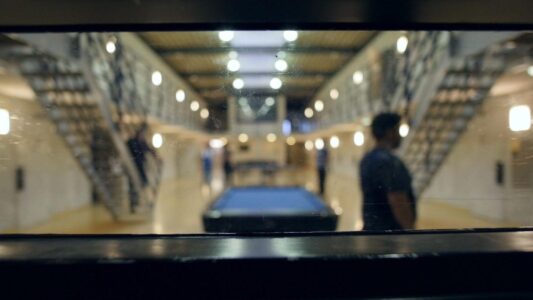
Terrorist prisons to be isolated in separation centres to prevent radicalisation
Dangerous prisoners will be isolated from the rest of the prison population in a bid to prevent them from radicalising other inmates, the government has announced.
Speaking to Sky News on Wednesday, Justice Secretary Dominic Raab said three Prison Service separation centres will be used “to isolate the most dangerous radicalising recruiters of terrorists”.
Mr Raab said the UK has “allowed understandable cultural and religious sensitives to deter us” and that this policy will “make sure we’ve got the common sense balance”.
A new team, set up at a cost of £1.2 million – will identify the most influential terrorists so they can be moved to one of the new centres.
The move comes as a review of terrorist activity in jails in England and Wales by the government’s independent reviewer of terrorist legislation, Jonathan Hall QC, is published.
It follows a series of high-profile cases, including the 2019 London Bridge attack when Usman Khan, a terrorist prisoner out on licence, stabbed two people to death.
“We’ve got these separation centres which are used to isolate the most dangerous radicalising recruiters of of terrorists,” Mr Raab told Sky News.
“We need to probably make great use of that. So I’m beefing up the money to target those offenders who need to be removed.
“And finally, we’ll need this Bill of Rights to replace the Human Rights Act to stop the legal attrition that we’re already starting to see with terrorists and extremists claiming a right to socialise within prison.
“What actually they want to do is radicalise.”
The justice secretary continued: “I think we have allowed understandable cultural and religious sensitivities to deter us, as Jonathan Hall sets out.
“And of course, what the Bill of Rights will do is – while respecting our fundamental freedoms – make sure we’ve got the common sense balance.
“And in this context, allowing prison governors to take the action they need to retain the security in the prison, but also to protect the public from these very dangerous people.”
In line with Mr Hall’s recommendations, Mr Raab said the process for referring prisoners to the separation centres will be strengthened against legal challenge to ensure they cannot frustrate a move on “trivial grounds”.
The Ministry of Justice (MoJ) is also investing £6 million in expanding the Prison Service’s close supervision centres where the most physically violent offenders – including terrorists – are held.
Meanwhile, prison staff will be given improved training to enable them to spot signs of terrorist activity in jails.
In his report, Mr Hall said the current threat in prisons was from Islamist terrorism and that there was “no other comparable threat”.
Source: Sky News





